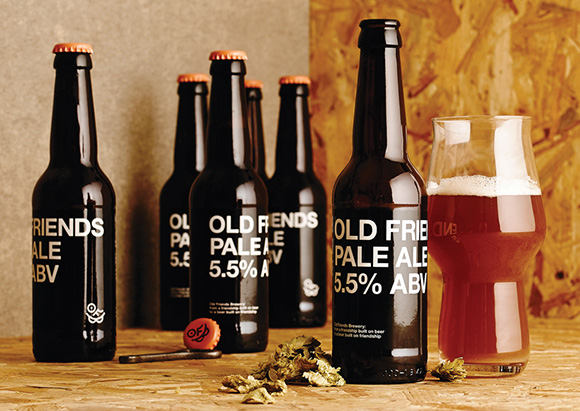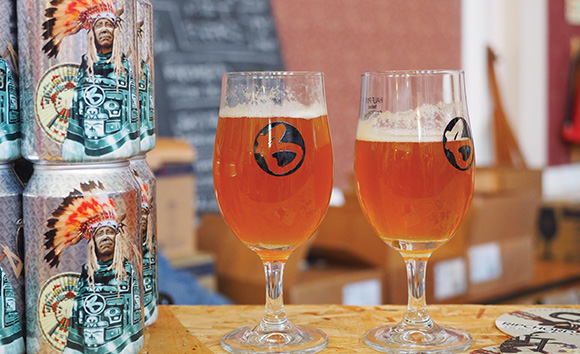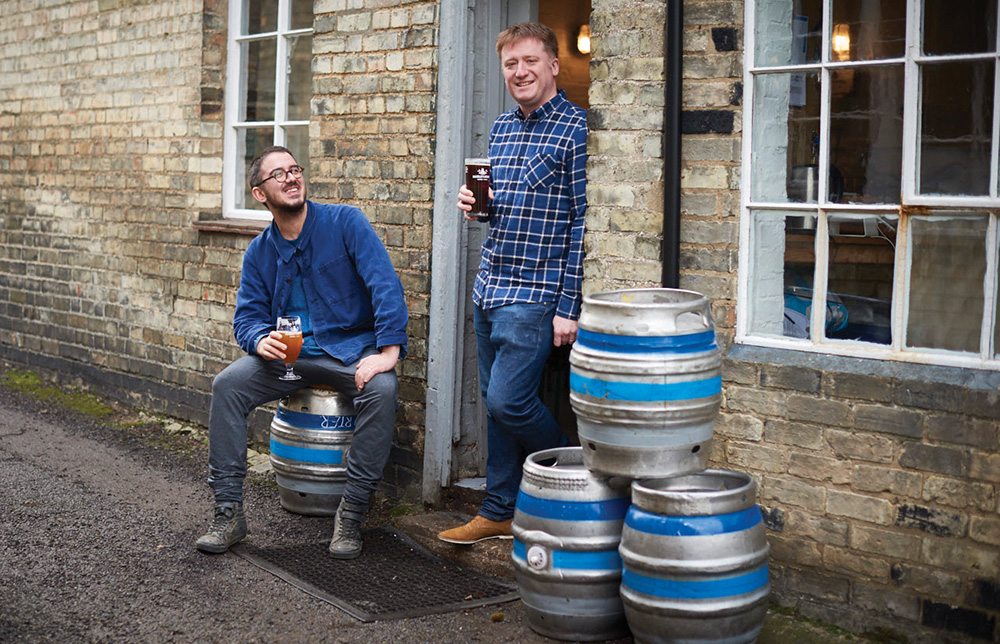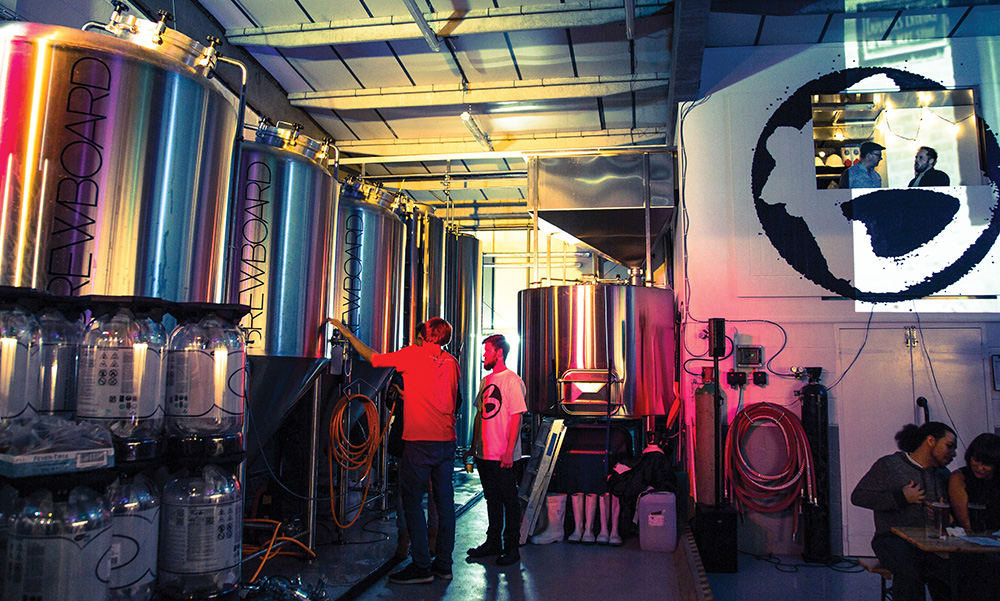Charlotte Griffiths meets the movers and shakers of the craft beer revolution brewing in Cambridge
In 1516, when Cambridge University was a mere 300 years old, Duke Wilhelm IV of Bavaria introduced the Reinheitsgebot – the beer purity laws – which insisted that every pint brewed in Germany should only use three ingredients: hops, barley and water. Yeast isn’t mentioned, because science hadn’t discovered it yet.
You might tweak the type of hops, or tinker with timings, but whether you’re a multinational super brewer or fiddling with demijohns in your airing cupboard, the basic recipe for beer has been the same ever since. But in 21st century Cambridge, there seem to be two extra ingredients required: time and space. And in a bustling and competitively-priced city like the one we call home, that’s what makes the difference between bland and brilliant.
Jon Cockley and Tim Pheasant are the old friends who Cambridge’s Old Friends Brewery is named for: they met at school and have stayed in touch ever since before launching their garage-based brewery in 2016.
Originally, the two brewers wanted to recreate the style of beers that they enjoyed themselves, strongly influenced by the US and the huge craft beer scene across the Atlantic.
“It’s a fusion of North American hops, grains and Cambridge water to make a sort of hybrid local-slash-US influenced beer,” Jon explains. “A bit like the city – very internationally minded…”

Old Friends now has a core set of beers, including a pale ale and session ale plus a new milk stout, and enjoys the ability to be responsive that small-scale brewing offers. “It’s great when you hit upon something people like and enjoy, but it’s not that much fun to brew the same beer time and time again – it’s nice to experiment and play,” Jon says. “It’s a question of trying styles that we like, or that we could put a twist on, and then having a go at making them.
You start with the style of beer and ABV that you’re going for, and then you start to piece together the bare bones of a recipe. Tim’s really good at this, and does a lot of research – he makes sure we get the balance and the bitterness right. You get 80 to 90{b486c5a37ab2d325d17e17d701cb2567b1ecd1814e8ceb33effa2a4f1f171d46} of the structure and then through the process of making the beer – tweaking your hop additions, how much dry hopping you do, when you do the dry-hopping – those are the little nuances that refine the taste. You’ve got to tinker with it, play with the recipe – kind of like a science lesson except at the end, you have something to drink…”
A labour of love
“Part of the reason for starting Old Friends,” says Jon, “was having a reason to get off the sofa and hang out with a mate. In our increasingly digital world, where you’re in front of a screen all the time, it’s so refreshing to physically make something with your hands – and then three weeks later, to drink it and share it. To have a tangible end product is very rewarding.”
Both Jon and Tim have other jobs aside from making beer: “Brewing is really laborious,” Jon says. “and there’s no getting away from the fact that it is a seven -or-eight-hour process where you have to be there – so we either start early, or brew in the evening and go right through. A lot of what we do is very manual – we hand bottle, we hand label, hand cap, hand stamp – it’s really time consuming. But it’s definitely a labour of love. This project very much falls between ‘is it a business, is it a hobby, is it a passion project?’ – it’s somewhere in the middle. I don’t really know where it’s going to take us, but we’re really enjoying it.”

As so many independent businesses discover, you can’t often rely on pure passion and talent to get you through: being able to run a company and get a beer to market is essential if you want to survive. The trio behind Harston-based microbrewery BrewBoard are very big on defined roles: the three directors Stuart Chambers, Paul Archer and Oliver Pugh divide tasks between themselves based on their individual strengths.
Paul explains: “We came together via a well-trodden love of beer but knew from the outset that if we were going to start and run a successful brewery we were going to have to complete the circle of great beer and great branding with hopefully some fairly solid and sensible business acumen. Stuart is a very talented brewer, Ollie is a very talented artist and graphic designer and I’m the sensible one with a background in finance who keeps this fiasco pointing in the right direction! That said, it’s a young business so we all have to muck in, humping kegs about, making deliveries, and serving and clearing up after our tap nights at the brewery!”
Little pockets
Tap nights, or some way for the public to buy beer direct from source, are universally agreed upon as a good way forward for small-scale breweries. BrewBoard hold twice-monthly late-night open-house style sessions at their brewery on an industrial estate in Harston, where they throw the doors open, a food truck or two parks outside, and a band sets up in front of BrewBoard’s four fermenting vessels, each illuminated by coloured spotlights.
“Initially it was local people coming by, but now we’re finding that as more and more people hear about us, we’ve got people from further afield getting on trains – we’ve had groups coming from London – and in that respect we’re delighted,” Ollie says. “But our local crew have been very good to us. Before we produce new beers at a production level, we’ll always test drive them on people who come to our tap nights, and we really respect what they have to say. And hopefully the reason they keep coming back is because they like our beers.”
But it’s not just focus-grouping that tap nights help with. “One of the main problems we face as brewers is that beer is fairly expensive to make,” Jon at Old Friends explains. “We’re selling it at a trade price – and then the people buying it and selling it on are the ones making the mark-up. So if you can sell direct to the public, then you’re keeping 100{b486c5a37ab2d325d17e17d701cb2567b1ecd1814e8ceb33effa2a4f1f171d46} of the profit. It makes huge sense. That said, premises in Cambridge…”
“You’ve got to tinker with it, play with the recipe –
kind of like a science lesson”
For Old Friends, access to space was the original catalyst for starting the brewery. “Tim bought a new house with a triple garage, which he wasn’t using – and we literally walked into it one day and said ‘What could we do in here?’” Jon says. “I think it’s a shame that Cambridge is so expensive and prohibitive – it makes it really hard for independent creative businesses to exist here. We were lucky. There are people who’ve found little pockets… I think that’s why Calverley’s has done so well: they’ve got that bit of land, they’ve got their tap room – having a tap room would be lovely.”
Calverley’s started brewing back in 2014, and first opened its doors with regular tap nights about two years ago. Based in a cluster of old industrial workshops next to the railway lines, the brewery is tucked away down a side street just off Mill Road on a pocket of land which brewer Tom Calverley says they’re “blessed to have”. The garage on the site was built by a relative’s grandfather back in the 1930s, and the buildings have lived many lives since then. “The brewery was originally a stables for a fire engine,” Tom says, “and I think the last business that was in there was a typewriter repair shop – you get an idea of the history.”
Calverley’s tap nights allow the public to try the huge range of beers brewed on site. “Our whole thing is that we give people tastes until they find something they enjoy,” Tom explains. “All we ask is an open mind. We brew a whole array of beer styles here: if you like white wine, we make a beer similar to that which is super dry and complex… We make a diversity of flavours, and let you taste until you find something that works for your palate.”

Tom is passionate about the local brewing scene in Cambridge, and agrees that space being at a premium in the city is a limiting factor. “I’d like to see a return to localisation of all good food and drink production,” he says, “and that’s what I’d like to think we’re part of. You’ve got people like Jack’s Gelato, some bakeries doing some really interesting things… but they all require space, and that’s
the problem.”
Sam Owens, owner of Thirsty and the brains behind its seasonal Biergarten events, is well-placed to talk about the demand for beer in our city. “It is a bit sad that there’s not more around,” he says. “I would have thought that in somewhere as young, dynamic, well-off, as international as Cambridge, that there would be more craft brewing, a younger brewing scene, and more places selling decent beer. It probably is to do with the fact that it’s difficult to get premises. Whatever space there is available is expensive, so it’s out of the reach of small, interesting, enterprising independents, whether they’re brewers or retailers.”
An honest drink
When it comes to Cambridge’s own tastes, Sam paints a picture split between traditional craft-style ales and more experimental brews: “The pale ales – the hoppier, session ales – have become very popular in the last few years, but people still like lagers and pilsners, the golden-style beers,” Sam says. ”We’ve also seen people going for these real one-offs, like imperial stouts aged in whisky barrels – with cherries and stuff dropped into them, which come in at 8, 9, 10, 12{b486c5a37ab2d325d17e17d701cb2567b1ecd1814e8ceb33effa2a4f1f171d46}, and you drink them like a wine. Also sour beers, a traditional style that’s been driven by the craft brewers and tends to be lower alcohol, highly refreshing, often flavoured with fruit to counter-balance the sourness – they can be pretty nifty. So I think it’s those two newer styles coming in alongside the more mainstream ones.”
With many of the small craft breweries looking to BrewBoard’s example and seeking to expand into premises outside the challenges of the city centre, there’s a lot to look forward to – in part because of the good relationships and supportive community that exists between the local brewers. “It’s really friendly and welcoming,” Jon at Old Friends says. “When we first started out we went to have a chat with the guys at Calverley’s – they were really open with us – and there doesn’t seem to be any kind of mystique. I think it’s because most people are in this business for the love, not for the money, and as a result that hopefully whittles away people who are trying to make a quick buck – and you end up with people who just have a love for it.”
Despite the cleaning involved, and the lack of space to experiment – at the end of the day, it’s clear that Cambridgeshire’s brewers are a passionate bunch, and adore what they do.
“It’s exciting!” Jon sums up. “It’s very everyman – it’s not pretentious. Even though we’re getting increasingly into this world of craft beer, and expensive, exotic and different beers – I still think, essentially, that beer is accessible, it’s not elitist, it’s welcoming. It’s just an honest drink.”
Beer on Instagram
With constantly-changing brews and test batches, the best way to keep up with Cambridge’s craft brewers is to follow them on social media – or drop by their regular tap nights to try their beers for yourself.
Calverley’s: @calverleysbrewery
BrewBoard: @brewboarduk
Old Friends: @oldfriendsbrew
Thirsty: @thirstycamb

